by Heather Kent | Jul 30, 2015
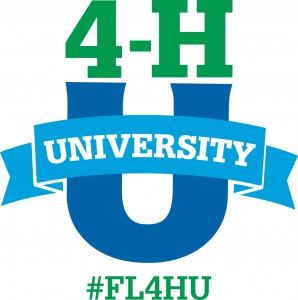 4-H University will be streaming live for your viewing pleasure at http://florida4h.org/live/:
4-H University will be streaming live for your viewing pleasure at http://florida4h.org/live/:
Tune in to see the impact UF IFAS Extension 4-H has on Florida’s youth. Don’t miss the awards banquet tonight at 6PM Eastern/5PM Central. During tonight’s program, you can see 4-Hers accept scholarships, watch the newly elected state officers inducted, and also see distinguished 4-H volunteers and stakeholders inducted into the Florida 4-H Hall of Fame! Two volunteers from the Florida Panhandle will be inducted tonight- Barry Hoffman from Leon County 4-H and Terry Stout from Okaloosa County 4-H. Both men have been volunteers at the club, county, district and state levels. They serve on both the Area A Horse Advisory Committee and the State 4-H Horse Advisory Committee and have supported the Florida 4-H Program for more than 20 years!
by Heather Kent | Jul 21, 2015

4-H Day at LEGOLAND is Saturday, September 26th. Be sure to wear your 4-H shirt and share photos #4heverywhere
The 3nd Annual 4-H Day at LEGOLAND on Saturday, September 26th. This event is an opportunity for 4-H members and their families to explore the LEGOLAND theme park at a deep discount, while raising funds for 4-H clubs, camps, and other educational programs. LEGOLAND is a great way to have fun with the entire family and learn about science, engineering, and technology. The Florida Department of Ag’s greenhouse is a must-see attraction. You can learn all about Florida agriculture and how we are feeding the nation and world. Just don’t eat the produce- it’s all made from LEGOs! You can also sign up for a robotics class while you are there to learn how engineers design, build, program, and test
robots.
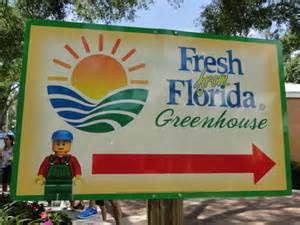
The Florida Department of Agriculture Greenhouse is a must-see attraction at LEGOLAND.
Frequently Asked Questions:
Tickets are $30.00/person ($5.00 per ticket benefits the Florida 4-H Foundation)
- Any family that has participated in 4-H is eligible for the discount (this includes 4-H clubs, camps, day camps, school, afterschool, and military 4-H programs)
- Youth under the age of 3 are admitted for free
- Tickets are only good for Saturday, September 26th, 2015
- Tickets must be ordered online at least 24 hours before the event
- Use this secure link to order 4-H discount tickets- https://goo.gl/JddkeW
- You do not have to bring your 4-H Membership Card, just bring the tickets you print at home generated by the link above
- If you have a 4-H t-shirt, please wear it! We would like to see a “sea of green” at LEGOLAND that day. You can order a 4-H t-shirt at: http://florida4h.org/4-h-days/
- You are responsible for your transportation to and from the park, and for making any reservations for overnight accommodations. Many of the hotels in the area offer free shuttle services to and from the park, so ask your hotel concierge. The onsite LEGOLAND Hotel recently opened and is offering some great deals.
- If you are driving to the park, parking costs $14.00, but you can save $2.00 if you order your parking pass online http://florida.legoland.com/.
- For information about park attractions, show schedules, food, height restrictions, or accommodations for persons with disabilities visit http://florida.legoland.com/.
- Please share photos of your LEGOLAND experience on social media using #4Heverywhere
by Heather Kent | Apr 15, 2015
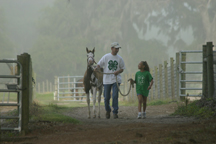
UF IFAS Photo
Last year, more than 4,000 youth participated in the Florida 4-H Horse Project. These youth would have never had the opportunity to learn horsemanship and leadership skills without horse project volunteers. Project leaders not only work with 4-H clubs, they often serve on committees to help plan and implement shows and other horse related events. In the Florida panhandle, twenty-three volunteers comprise the Area A 4-H Horse Advisory Committee. These volunteers plan and execute our district qualifying show (coming up this weekend in Marianna) as well as assist with the state horse show in Tampa. They also plan other horse project related events such as horse judging, showmanship clinics, nutrition seminars, 4-H Hippology and Horse Quiz Bowl.
“The Area A Horse Committee Volunteers are some of the most dedicated volunteers I have ever met,” shares Heather Kent, the regional 4-H agent. “Many of them have witnessed first-hand the potential of the 4-H horse program to help youth learn lifelong leadership and communication skills and they share a legacy of caring and compassion that influences every youth they work with.”
Terry Stout is one of those volunteers. Terry states, “I grew up in 4-H and FFA and when my daughters were old enough, they joined the Eglin Riding Stables 4-H Club to learn how to groom and care for their horses. 4-H was a large influence on them and now that they are alumni, they give back by teaching and helping the next generation of horse kids. I have learned a lot as a volunteer, and I am involved on many advisory boards because I know I can help most by being a voice for youth and other volunteers.”
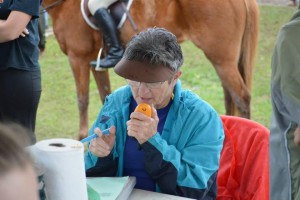
4-H volunteers plan and implement educational events at the club, county, district and even state levels. Escambia County 4-H Photo
Anne Peterson, a 4-H volunteer from Escambia County, says “I became involved with 4-H when my daughter was 10 years old. I have always wanted to protect our youth and see that they receive the best instruction possible for their horse project. In order to see this happen, I became involved in the local, area, and state horse program. Today I still see the need for volunteers to continue making the best better and as long as there is a need I want to help any way I can.” Anne was inducted to the Florida 4-H Hall of Fame in 2013 for her service as a volunteer.
Barry Hoffman, a Leon County volunteer, got involved in 1997 with the Trailblazers 4-H Club. Seeing a need for funds to help youth attend 4-H horse camp, Barry led a committee to organize a Horse Expo at the North Florida Fairgrounds to teach others about riding techniques, horse management, tack sales, and more. “Barry is always available to help with whatever is needed- which has even included helping me when by car broke down on the interstate on the way to a horse committee meeting. He continues to serve at the district level eleven years after his youngest son graduated from 4-H. Barry plays a major role in both the area and state horse shows, and is an incredibly valuable resource for us,” says Marcus Boston, the Leon County 4-H Agent.
Jean McMillian, a Gulf County volunteer, has been involved for more than 40 years. Roy Carter, the Gulf County Extension Director says, “Mrs. McMullian has led three generations of 4-H youth through the 4-H horse program. Her club, the Big River Riders 4-H Club, holds the county record for the longest running 4-H club and she is one of the strongest leaders we have ever had the pleasure to work with. She has been the backbone of our horse program and is always willing to help in any capacity.” Her son Russell is continuing the family tradition by being involved as the co-chair for the speed events for the area qualifying show.
Terry Harris has volunteered in both Jackson and Gadsden counties since the early 90’s, helping hundreds of youth with their horse projects. Angel Granger, the Jackson County 4-H Agent shares, “Even though his nephews are grown now, Terry continues to work tirelessly with 4-H and is a wonderful advocate for the program. We are very fortunate to have someone like him working at both the club level and serving as a member of the 4-H Area A Horse Advisory Committee.”
Lucy Notestine has been a volunteer for the last 8 years, and currently serves as the Area A Horse Advisory President. She, her daughter Shane Kenny and Dara Strickland raise over $2,000.00 each year to provide incentive awards for area horse show participants. Their 4-H Agent, Dr. Paula Davis says, “They realize that many youth are too young to advance to the state show therefore they work really hard to make the Area A Show a special event to encourage further participation and help the program grow.”
These stories have one very important thing in common- each of these volunteers has a heart for helping young people succeed. If you have a similar passion, consider becoming a 4-H volunteer. To find out how, contact your local Extension Office or visit http://florida4h.org/volunteers. If you are a parent or volunteer new to the 4-H Horse Project, Angel Granger,has developed a handy checklist to help you prepare for your next show. You can download the checklist and keep it in your show box or horse trailer so that you are always prepared to do your very best. If you laminate the list, you can use a dry-erase marker to check items off each time you pack your trailer.
Your opinion matters to us! Please complete this short survey so we can improve this blog https://ufl.qualtrics.com/SE/?SID=SV_3gtLKjqia3F75QN.
by Heather Kent | Apr 13, 2015

Mrs. Ruth Ann Scurry has been a volunteer for the Jefferson County Hickory Hill 4-H Club for 20 years.
What keeps a volunteer motivated to serve for more than 20 years? If you ask Mrs. Ruth Ann Scurry, a Jefferson County 4-H club leader, she will tell you it’s about making a difference in a young person’s life! Mrs. Scurry raised three sons who were active 4-H members. Her son Kenya even competed at the state level with his demonstration on small engines. Her sons benefited so much from the 4-H program that when her youngest son graduated, she decided to start a 4-H club at her local church called the Hickory Hill 4-H Club. Twenty years later, she still leads this club which focuses on healthy living programs, as well as sewing, gardening, fishing, and consumer choices.
When asked what advice Mrs. Scurry has for club leaders, she shared, “you have to remember to keep the lessons you teach practical and hands on. When teaching nutrition, I show them what a portion size is and remind them to each like a king (breakfast), queen (lunch), and pauper (dinner). If you use examples and language they understand, they will remember. You also have to keep it fun. I make sure to plan a fun treat every now and then to keep the kids motivated and surprised and it works every time. They never want to miss a meeting!”
When asked what is most challenging about being a volunteer today, Mrs. Scurry says, “Many young people today live with only one parent, grandparent, or other relative. These families need help raising their children. 4-H encourages them to make good choices and helps them feel like they belong to an extended family- a 4-H family. 4-H helps them learn how to follow rules and to respect others. Being a good role model is important too. It’s so true that ‘it takes a village to raise a child.’”
Mrs. Scurry has helped build a “4-H village” of caring adult volunteers for her club. She offers simple yet sage advice on how to do this: “Get everyone involved.” She involves everyone from 5-years olds to 83 years old as members and volunteers in her club. She empowers them to make a difference in the lives of 4-H youth by finding out what their strength is, and then asking them to share that strength with the club through an activity, field trip, demonstration, or project.
Mrs. Scurry has not limited her service to just her club. She has also volunteered as a chaperone for 4-H Camp Cherry Lake, the North Florida Fair, and even spearheaded a volunteer appreciation luncheon for local volunteers and community leaders.
Mr. John Lilly, the Jefferson County Extension Director stated, “All of Ms. Scurry’s hard work and dedication affects the entire Jefferson County 4-H Program in a positive way. We are fortunate to have such a loyal and faithful volunteer leader.”
In honor of National Volunteer Appreciation Week, 4-H in the Panhandle is sharing stories of inspirational 4-H volunteers every day this week. if you find Mrs. Scurry’s story inspiring, consider becoming a volunteer yourself! Nearly 3,000 volunteers in the Florida panhandle are making a difference in the lives of more than 28,000 youth. In 4-H, you can leverage your experience and skills to help a young person find their own passions and interests. 4-H needs volunteers like you to inspire the next generation. To learn how to become a 4-H volunteer, contact your local Extension Office or visit http://florida4h.org/volunteers.
Your opinion matters to us! Please take this short survey to help make our blog better. https://ufl.qualtrics.com/SE/?SID=SV_3gtLKjqia3F75QN
by Heather Kent | Mar 20, 2015
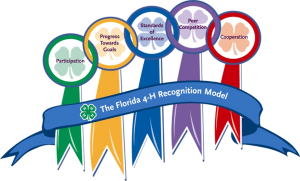
Florida 4-H Recognition Model
Recognition is a basic human need and can help build positive self esteem if handled in the right way and is an important part of the Florida 4-H Program. Whitney Cherry and Karen Miliffe shared tips for club leaders on showing recognition in 4-H clubs during the March Make a Difference Monday session earlier this month. If you missed it, you can view the recorded session at http://florida4h.org/madmondays.
Recognition is more meaningful when it occurs soon after it is earned and is related to a specific task. It can take multiple forms– appropriate recognition varies depending on age, past experience, family lifestyle, community and cultural heritage. Recognition motivates people to excel and take risks and in 4-H, it is the acknowledgement and affirmation of personal growth of an individual or group (such as a club). Awards are simply the things we give people or groups to symbolize our recognition of their accomplishments or effort.
The Florida 4-H Recognition Model includes five types of accomplishments or goals. The five types of accomplishments that 4-H measurers for recognition are:
- Participation in educational experiences (certificates, t-shirts, participation ribbons). The requirements for recognition for participation in a 4-H event are well publicized and easy to achieve. These types of recognition can be earned many times and are usually not expensive, but valued.
- Progress toward self-set goals. It is important for youth to learn to set goals and work towards them. 4-H project books are one way that we provide feedback on self-set goals. The club annual program is a tool for setting the collective goals of the club. As volunteers, we can assist youth with this by reviewing their goals frequently during the 4-H year, identifying what they have accomplished so far and helping them determine their next steps toward a goal.
- Achieving standards of excellence. In 4-H standards are used in two ways:
- Standards are established by subject matter and youth development specialists to provide a basis for young people to plan and work toward their goals
- Professional staff and /or volunteers and young people work together to establish standards– such as dress code at 4-H University, expectations of 4-Hers in club meetings, desired behavior at 4-H events/ camp
- Excelling in peer competition (judging contests, speaking contests, exhibits, animal exhibits and shows, portfolios, project book contests). Competition has long been a component in the 4-H program. 4-H strives to make competition an educational process and an opportunity to teach youth life skills. Peer competition is competing against one another’s peers. Numerous competition exist form the local club level, county, district, state, regional and national. 4-H also provides opportunities for clubs to compete against other clubs with the Club Standards of Excellence and Community Pride programs. Keep in mind that competition is not suitable for all ages (members 5-7 years old) and competition rules and procedures should be clear.
- Excelling in cooperation within a group (team or club awards or media recognition for service projects). From the beginning 4-H has encouraged young people to work together to learn. Cooperation engages young people in group experiences that are interdependent– face-to-face interactions, individual and group responsibility, group skills development. Cooperation involves everyone in the group and uses mutually agreed upon goals.
Recognition is a significant incentive to further learning. When properly used, it inspires young people to belong. Through caring adults and peers, in an inclusive and safe environment, recognition helps meets the needs of young people. Youth become and stay active in 4-H because they benefit. 4-H provides many opportunities for volunteers to make a difference in the lives of young people. If every young person could step into 4-H, imagine all the resourceful problem solvers, skilled workers, and capable leaders they’d become. That future is in our reach if we all lend our time and talents to guide the young people who will create it. Make the investment of a lifetime- become a 4-H volunteer, and inspire the next generation!
 4-H University will be streaming live for your viewing pleasure at http://florida4h.org/live/:
4-H University will be streaming live for your viewing pleasure at http://florida4h.org/live/:





